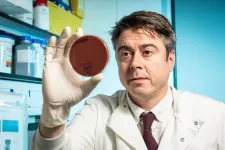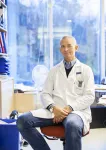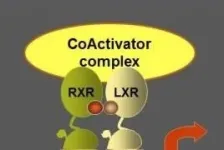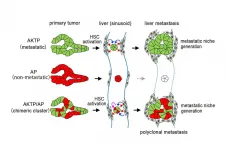Citizens versus the internet
How can we protect ourselves against manipulation, fake news, and other digital challenges? Tips from a behavioral science perspective
2021-02-12
(Press-News.org) The Internet has revolutionized our lives - whether in terms of working, finding information or entertainment, connecting with others, or shopping. The online world has made many things easier and opened up previously unimaginable opportunities. At the same time, it presents both individuals and societies with major challenges: The underlying technologies do not necessarily serve users' best interests.
"We're interested in questions such as: How can we create online environments that respect human autonomy and promote truth? And what can people themselves do to avoid being misled and manipulated?", says Anastasia Kozyreva, lead author and researcher at the Center for Adaptive Rationality at the Max Planck Institute for Human Development. The research team began by examining the differences between the online and offline worlds, and identified four major challenges.
User behavior is influenced by manipulative choice architectures. These "dark patterns" steer users toward unintended behaviors; they include advertising that blends into the content or navigation of a page to generate more clicks, or confusing privacy settings that prompt people to share more information than they really want to.
The information presented by AI-powered information architectures is not neutral; it is personalized on the basis of the data collected from users. This means that two people who enter the same term into a search engine will probably be shown different results. That can be helpful if, for example, we want to look up a restaurant and the search engine displays hits in our neighborhood at the top of the list, rather than a restaurant with the same name on the other side of the world. But if we are shown news or political content solely on the basis of our preferences, we risk finding ourselves in a filter bubble where we are no longer exposed to any other opinions.
The research team sees false and misleading information as another challenge for people online. Videos and posts propagating conspiracy theories and unverified rumors can spread rapidly through social media, causing real harm. For example, people may decide not to get vaccinated due to misinformation about vaccines, putting themselves and others at risk.
Distracting online environments constantly seek to attract users' attention - whether by means of push notifications, flashing displays, pop-up ads, or constantly updated content. The aim is to capture and hold users' attention for as long as possible: That is the very basis of Internet platforms' business models. We find ourselves spending far more time on our screens than we intended - with no real benefit and at the cost of our attention for other things.
Taking a behavioral science perspective, the researchers propose specific interventions to address these four challenges. They suggest that "boosting tools" can be used to train new competencies and enable better, more autonomous decisions in the online world.
Self-nudging is one of the cognitive tools that people can use to create "healthier" choice and information environments for themselves. Self-nudging empowers people to set up their digital environment in the way that works best for them. This might involve turning off notifications from apps or rearranging one's smartphone home screen so that only useful apps are displayed: the calendar, camera, and maps, for example, along with meditation and weather apps. Everything that is overly distracting, such as social media and games, is better tucked away in folders. The researchers also recommend that users consciously set time limits on their social media use.
"The digital world is full of traps," says Ralph Hertwig, Director of the Center for Adaptive Rationality at the Max Planck Institute for Human Development. "But we can take steps to avoid falling into them. In the same way as we might hide our chocolate stash at the back of the cupboard and put a bowl of apples on the table, we can turn off notifications from apps that permanently demand our attention. Out of sight is out of mind - whether in real life or in the digital world."
And just as we look right and left before crossing a street, we should make a habit of asking certain questions to evaluate the content we encounter online. Questions such as: What is the origin of the information? Which sources are cited? Can I find similar content on reputable websites? This approach can boost users' competence in evaluating the reliability of online information. But Internet platforms could also help users to assess content - for example, by displaying decision trees that remind users to check the source and the facts before sharing content.
More generally, however, policymakers also need to consider putting in place stronger regulatory measures to ensure that Internet users retain control over the digital environment and their personal data - for example, through default privacy settings. Last but not least, the smart and self-determined use of digital technologies needs to be taught in both school and adult education. The earlier, the better.
The researchers emphasize that none of the interventions they propose can singlehandedly counter online manipulation or prevent the spread of misinformation. "It will take a combination of smart cognitive tools, early media literacy education, and a regulatory framework that limits the power of commercial interests to hijack people's attention to make the online world a more democratic and truthful place," says Stephan Lewandowsky, professor of cognitive psychology at the University of Bristol.
INFORMATION:
The Max Planck Institute for Human Development in Berlin was founded in 1963. It is an interdisciplinary research institution dedicated to the study of human development and education. The Institute belongs to the Max Planck Society for the Advancement of Science, one of the leading organizations for basic research in Europe.
ELSE PRESS RELEASES FROM THIS DATE:
2021-02-12
An international team of scientists has determined how harmless E. coli gut bacteria in chickens can easily pick up the genes required to evolve to cause a life-threatening infection. Their study, published in Nature Communications, warns that such infections not only affect the poultry industry but could also potentially cross over to infect humans.
E. coli is a common bacterium that lives in the intestines of most animals, including humans. It is usually harmless when it stays in the gut, however it can become very dangerous if it invades the bloodstream, causing ...
2021-02-12
"We are surrounded by a huge number of systems - biological, technical, economic, which we can influence, which we can control. The task is to do it optimally, for example, reaching the desired point with a minimum of effort, resources, and time, - explains Prof. Yurii Averboukh. - From a mathematical point of view, the task is narrowed down to the theory of optimal control. A classic example of this theory is moon landing: fuel consumption optimization enables to increase cargo volumes transported to the moon".
A special section of optimal control theory is the theory of differential games. It studies the control ...
2021-02-12
Sophia Antipolis, 12 February 2021: An active lifestyle is linked with a lower chance of dying immediately from a heart attack, according to a study published today in the European Journal of Preventive Cardiology, a journal of the European Society of Cardiology (ESC).1
Heart disease is the leading cause of death globally and prevention is a major public health priority. The beneficial impact of physical activity in stopping heart disease and sudden death on a population level is well documented. This study focused on the effect of an active versus sedentary lifestyle on the immediate course of a heart attack - an area with ...
2021-02-12
A study has now been presented that boosts the evidence for using AI solutions in skin cancer diagnostics. With an algorithm they devised themselves, scientists at the University of Gothenburg show the capacity of technology to perform at the same level as dermatologists in assessing the severity of skin melanoma.
The study, published in the Journal of the American Academy of Dermatology, and its results are the work of a research group at the Department of Dermatology and Venereology at Sahlgrenska Academy, University of Gothenburg.
The study was conducted at Sahlgrenska University ...
2021-02-12
Novel genetic associations could pave the way for early interventions and personalized treatment of an incurable condition.
Scientists from the University of Bergen (Norway) and Karolinska Institutet (Sweden) have discovered the genes involved in autoimmune Addison's disease, a condition where the body's immune systems destroys the adrenal cortex leading to a life-threatening hormonal deficiency of cortisol and aldosterone.
Groundbreaking study
The rarity of Addison's disease has until now made scanning of the whole genome for clues to the disease's genetic origins difficult, as this method normally requires many thousands of study participants. However, by combining the world's two largest ...
2021-02-12
Tumor cells are able to avoid the attack of the immune system through several mechanisms. For instance, these can secrete factors that turn macrophages -cells in the immune system- into dual action agents that contribute to the tumor progress and will protect it from immune body defences: these become, thus, the tumor-associated macrophages (TAMs).
An article published in the journal Cancer Research describes a new molecular mechanism that counteracts the immunosupressive action of these macrophaes to boost tumor growth, and brings knowledge of potential interest for the design of future therapeutical options against cancer. The preclinical study is led by the tenure-track 2 lecturer Annabel Valledor, from the Faculty ...
2021-02-12
Most tumors consist of a heterogenous mix of cells. Genetic mutations found only in some of these cells are known to aid with the spread and progression of cancer. However, oncologists often find that when tumors metastasize to distant organs, they retain this heterogenous nature--a phenomenon termed "polyclonal metastasis". The mechanism by which non-metastatic cells accompany the metastatic cells is ambiguous. Now, Masanobu Oshima and his research team have used mouse models to explain how non-metastatic cells begin their long commute.
The team has previously developed various cancerous mutants of mice and analyzed ...
2021-02-12
New research shows that hurricane maximum wind speeds in the subtropical Atlantic around Bermuda have more than doubled on average over the last 60 years due to rising ocean temperatures in the region.
Hurricanes intensify by extracting energy from the warm ocean surface via air-sea heat fluxes, so a warmer ocean can lead to more intense hurricanes.
Improving predictions of wind speeds from hurricanes will help determine the right level of response in advance of the storm and potentially limit the resulting damage in Bermuda.
Between 1955 and ...
2021-02-12
Hydrogen for energy use can be extracted in an environmentally friendly way from water and sunlight, using photocatalytic composite polymer nanoparticles developed by researchers at Uppsala University. In laboratory tests, these "polymer dots" showed promising performance and stability alike. The study has been published in the Journal of the American Chemical Society.
How we are to meet future demand for sustainable energy is a much-debated question. One feasible way to go is hydrogen, which can be produced from renewable resources: water and solar energy. But the process ...
2021-02-12
Cisplatin is one of the most effective chemotherapy agents, used in just under half of pediatric cancer cases. Permanent hearing loss is a common side effect of this medication, but until now, studies have been too small and too varied to accurately characterize this risk. Today in The Lancet Child & Adolescent Health, investigators at Children's Hospital Los Angeles published results of the largest study of cisplatin-induced hearing loss to date. The study establishes the first benchmarks for the prevalence of hearing loss, and reveals that the risk of hearing loss is affected not only by how much drug is given, but by how that drug is delivered--dosing schedules, complementary treatments, and more. These findings will allow oncologists to deliver more information ...
LAST 30 PRESS RELEASES:
[Press-News.org] Citizens versus the internet
How can we protect ourselves against manipulation, fake news, and other digital challenges? Tips from a behavioral science perspective






